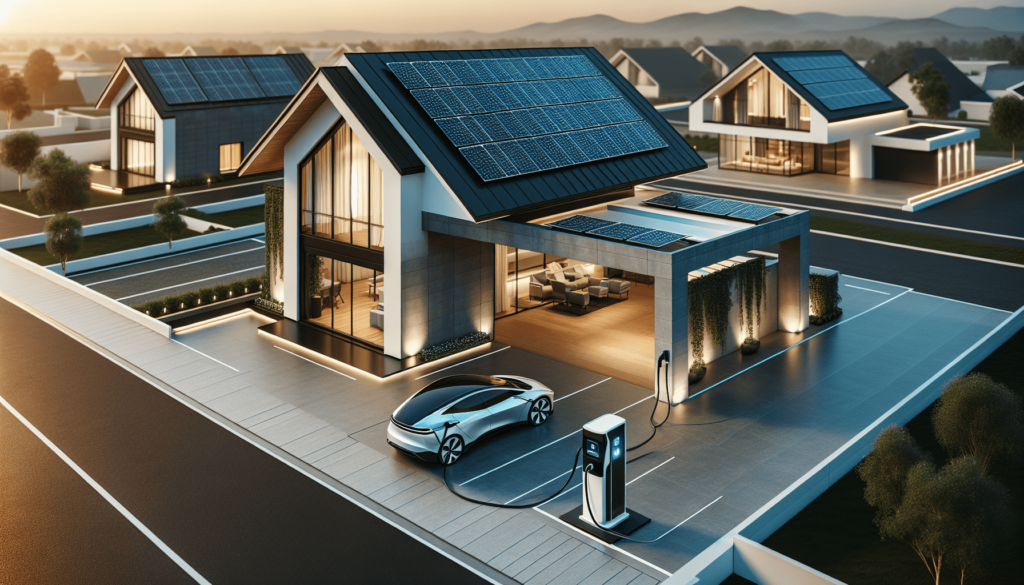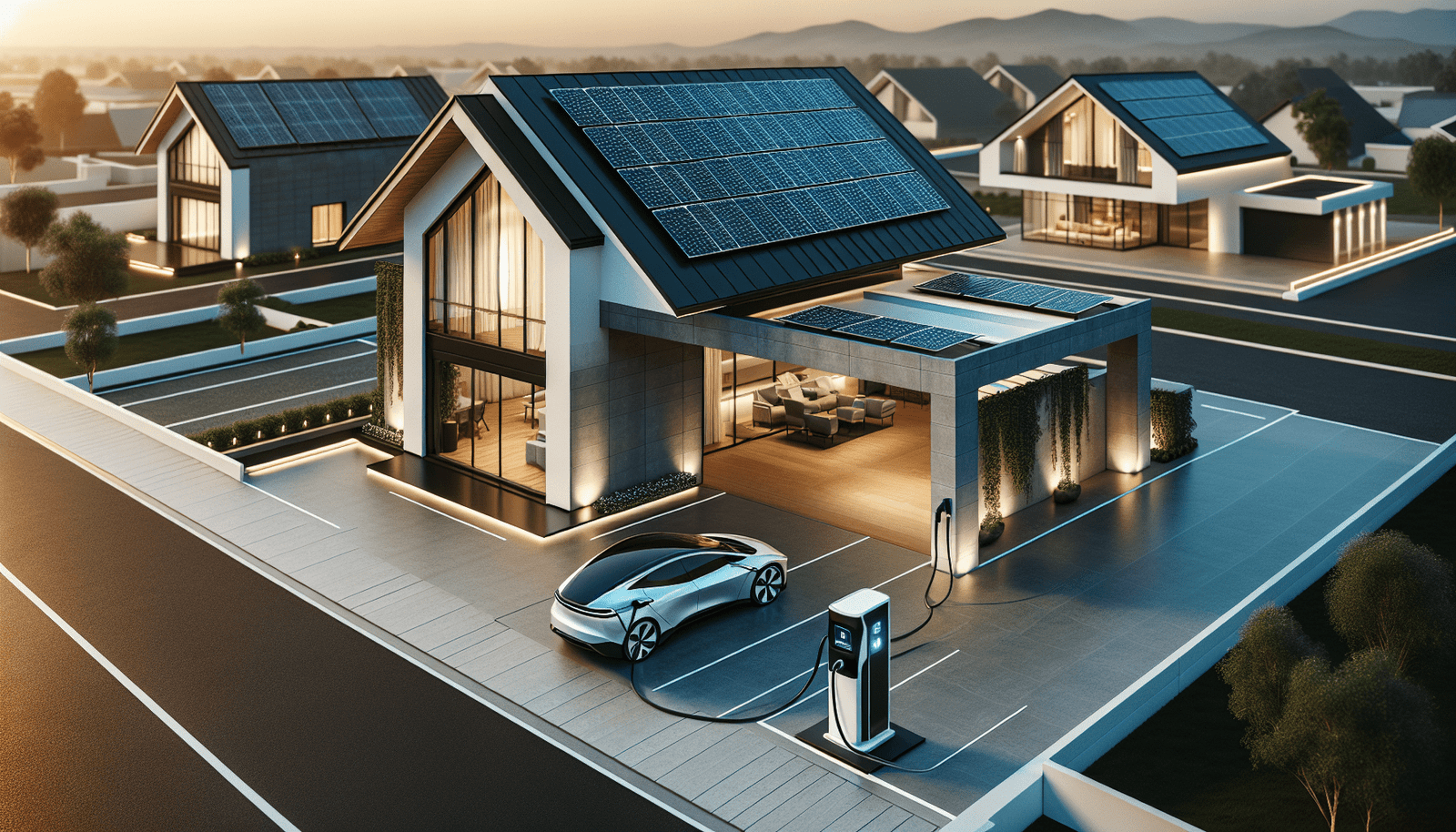Have you ever wondered if you could charge your electric vehicle using solar panels right at your own home? With the exponential growth of both electric vehicles and solar power, it’s an enticing idea to imagine harnessing the sun’s energy to power your daily commute. The concept of pairing solar panels with electric vehicles has become increasingly popular, but is it actually feasible? In this article, we will explore the possibilities and limitations of charging electric vehicles using solar panels at home, allowing you to make an informed decision about the future of your clean and green transportation.

Advantages of Charging Electric Vehicles with Solar Panels
Reduced carbon emissions
Charging electric vehicles (EVs) using solar panels at home offers a significant advantage in terms of reduced carbon emissions. Solar energy is a clean and renewable source of power, allowing EV owners to decrease their reliance on fossil fuels and contribute to a greener environment. By utilizing solar energy to charge their vehicles, individuals can reduce their carbon footprint and help combat climate change.
Lower energy costs
Another advantage of charging EVs with solar panels is the potential for lower energy costs. Solar energy is free, and by harnessing the power of the sun, you can generate electricity to charge your vehicle without relying solely on utility power. This can result in substantial savings on your utility bills, especially considering the rising prices of fossil fuel-based energy sources. By investing in solar panels, you not only contribute to sustainable energy usage but also save money in the long run.
Increased energy independence
Charging your EV with solar panels provides you with increased energy independence. With a solar-charged vehicle, you become less reliant on the traditional electrical grid. This is especially beneficial during power outages or emergencies when the grid may be compromised. Solar energy allows you to become self-sufficient, generating your own power and ensuring that you have a reliable source of energy to charge your EV even in challenging situations.
Components Required for Solar Charging
In order to charge your EV with solar panels, several essential components are required. Let’s take a closer look at each of them:
Solar panels
Solar panels are the primary component of a solar charging system. They are responsible for converting sunlight into electricity, which can then be used to charge your EV. When selecting solar panels, it’s important to consider factors such as efficiency, durability, and warranty to ensure optimal performance and longevity.
Charge controller
A charge controller is necessary to regulate the flow of electricity from the solar panels to the battery storage. It helps prevent overcharging and ensures that the battery is charged efficiently. High-quality charge controllers are capable of optimizing the charging process, prolonging the lifespan of the battery and maximizing energy efficiency.
Battery storage
Battery storage is crucial for solar charging systems as it allows you to store excess energy generated by the solar panels. This stored energy can then be used to charge your EV even when the sun is not shining. The capacity and type of battery storage you choose will depend on your energy requirements and budget.
Inverter
An inverter is required to convert the direct current (DC) electricity generated by the solar panels into alternating current (AC) electricity, which is compatible with most home electrical systems and EV chargers. An efficient and reliable inverter is essential to ensure smooth and uninterrupted charging.
Calculating Solar Panel Requirements
Before installing a solar charging system for your EV, it’s important to calculate the solar panel requirements. This involves determining your energy consumption, calculating panel capacity, and accounting for weather conditions.
Determining energy consumption
To calculate your energy consumption, you need to consider factors such as your EV’s battery capacity, its efficiency, and the average daily distance you drive. By estimating the energy required to charge your EV on a daily basis, you can determine the number of solar panels needed to meet your energy needs.
Calculating panel capacity
Once you have determined your energy consumption, you can calculate the required panel capacity. Solar panel capacity is measured in watts, and by considering factors such as panel efficiency, sunlight availability, and energy loss during conversion, you can determine the appropriate capacity to ensure reliable charging.
Accounting for weather conditions
Weather conditions play a significant role in solar energy production. It’s important to account for factors such as cloud cover, shading, and seasonal variations when calculating solar panel requirements. By considering average weather conditions in your area, you can estimate the amount of sunlight available and adjust your solar panel capacity accordingly.
Installation Process
Installing a solar charging system for your EV involves several key steps. Let’s take a closer look at each of them:
Assessing location feasibility
Before installing solar panels, it’s important to assess the feasibility of your location. Factors such as roof orientation, shading from nearby buildings or trees, and local regulations should be taken into consideration. Assessing the feasibility of your location helps determine the potential solar energy production and ensures an optimal setup.
Determining optimal panel placement
Once the location feasibility is confirmed, it’s crucial to determine the optimal panel placement. This involves considering the angle, tilt, and orientation of the panels to maximize sunlight exposure throughout the day. By placing the panels in the ideal position, you can maximize their efficiency and energy production.
Securing necessary permits
Before installing solar panels, you may need to secure the necessary permits and approvals from local authorities. Permit requirements vary depending on your location and the size of your installation. It’s essential to research and comply with all legal requirements to ensure a smooth and hassle-free installation process.
Installing solar panels
Once all the necessary preparations have been made, it’s time to install the solar panels. This usually involves mounting the panels securely on your roof or an appropriate structure, connecting them to the charge controller, inverter, and battery storage system, and ensuring that all electrical connections are safely and correctly established. It’s important to hire a professional installer or follow detailed installation instructions to ensure a safe and efficient setup.

Ensuring Effective Charging
To ensure effective charging of your EV with solar panels, there are several key considerations to keep in mind:
Choosing the right charge controller
Selecting a charge controller that is compatible with your EV and battery storage system is essential for efficient charging. A good charge controller should have features such as maximum power point tracking (MPPT) to optimize energy conversion, temperature compensation to account for weather variations, and safety mechanisms to prevent overcharging.
Optimizing panel orientation
Ensuring that your solar panels are correctly oriented plays a crucial role in maximizing energy production and charging efficiency. Panels should be angled and positioned to receive the maximum amount of sunlight throughout the day. Regular monitoring and adjustment of panel orientation can help optimize charging performance.
Monitoring energy production
Regularly monitoring your solar panel system’s energy production is important to ensure optimal charging performance. Monitoring can help identify any issues or inefficiencies, allowing for timely maintenance or adjustments. Various monitoring systems and apps are available that provide real-time data on energy generation, enabling you to track your system’s performance.
Maintaining battery storage
Proper maintenance of your battery storage system is essential for long-term performance and optimal charging. This includes regular inspections, cleaning, and ensuring appropriate temperature and ventilation. Following manufacturer guidelines and taking necessary precautions can help extend the lifespan of your batteries and maintain consistent charging performance.
Potential Challenges and Considerations
While charging EVs with solar panels offers numerous advantages, there are also some potential challenges and considerations to be aware of:
Initial investment
Investing in a solar charging system requires an initial investment, including the cost of solar panels, batteries, and other necessary components. However, it’s important to note that over time, the savings on energy costs and potential government incentives can offset the initial investment.
Limited charging during cloudy days
Cloudy days can affect the energy generation of solar panels, potentially limiting the amount of energy available for charging your EV. However, with proper panel capacity calculation and battery storage, you can still have sufficient energy reserves to charge your EV even during periods of low sunlight.
Grid-tied vs. off-grid systems
When considering solar charging, you have the option to connect your system to the electrical grid or go completely off-grid. Grid-tied systems allow you to sell excess energy back to the grid, potentially offsetting your energy costs. Off-grid systems offer increased energy independence but require larger battery storage capacity and careful energy management.
Impact on home electrical system
Integrating a solar charging system with your home’s electrical system requires careful planning and installation. It’s essential to ensure that your electrical system can handle the additional load and that you comply with all safety regulations. Consulting a professional electrician or installer is recommended to ensure a safe and effective setup.
Battery Storage Options
Battery storage is a critical component of a solar charging system. Several options are available for EV owners to choose from:
Lead-acid batteries
Lead-acid batteries have been used for a long time and are relatively affordable. They are suitable for smaller solar charging systems and provide reliable storage. However, they require regular maintenance and have a limited capacity for deep and frequent discharges.
Lithium-ion batteries
Lithium-ion batteries have gained popularity due to their high energy density and longer lifespan compared to lead-acid batteries. They offer better efficiency, require less maintenance, and can handle deeper discharges. While they may initially have a higher cost, their performance and longevity make them a preferred choice for many EV owners.
Flow batteries
Flow batteries are a newer technology that offers high storage capacity and durability. They can endure frequent charge and discharge cycles without significant degradation. Flow batteries are still relatively expensive and may require professional installation, but they provide excellent storage performance for long-term EV charging.
Hydrogen storage
Hydrogen storage is an emerging technology that allows for long-duration energy storage. While still in its early stages, hydrogen storage systems have the potential to provide large-scale energy storage, enabling extended charging capabilities for EVs. However, their high cost and complex infrastructure requirements make them less accessible for residential applications.
Case Studies and Success Stories
Numerous case studies and success stories showcase the effectiveness and benefits of charging electric vehicles with solar panels:
Residential solar charging setups
Many homeowners have successfully integrated solar panels into their charging systems, significantly reducing their energy costs and carbon footprint. These setups have allowed them to enjoy reliable and sustainable charging while maximizing their energy independence.
Commercial solar charging stations
Commercial solar charging stations have been established in various locations, offering EV owners the convenience of solar-powered charging. These stations enable multiple vehicles to charge simultaneously, further reducing carbon emissions and promoting clean transportation.
Integration with smart home systems
Integration of solar charging systems with smart home technologies has allowed for more efficient and automated charging. By utilizing intelligent scheduling and monitoring, EV owners can optimize their energy consumption and charging patterns, further enhancing the benefits of solar-powered charging.
Future Developments and Innovations
The future of solar charging for electric vehicles looks promising, with ongoing developments and innovations that aim to enhance the efficiency and effectiveness of these systems.
Enhanced energy storage solutions
Advancements in battery storage technology continue to drive improvements in solar charging systems. This includes the development of higher-capacity and longer-lasting batteries, as well as innovations in energy management and controls.
Increased integration with electric vehicle manufacturers
Collaboration between solar panel manufacturers and electric vehicle manufacturers is on the rise. This integration allows for seamless compatibility between the charging systems and vehicles, optimizing the charging process and overall performance.
Advanced solar panel technologies
Research into advanced solar panel technologies, such as thin-film solar cells and tandem solar cells, promises higher efficiency and lower costs. These advancements could further enhance the feasibility and affordability of solar charging systems for EVs.
Conclusion
Charging electric vehicles with solar panels at home offers significant advantages, including reduced carbon emissions, lower energy costs, and increased energy independence. By carefully calculating solar panel requirements, following proper installation procedures, and ensuring effective charging, EV owners can enjoy the benefits of clean and sustainable transportation. While there may be challenges and considerations, advancements in battery storage options and ongoing developments in solar panel technologies promise an even brighter future for solar-powered EV charging.

